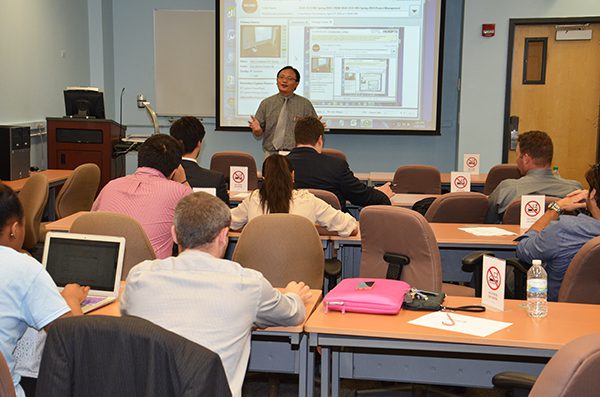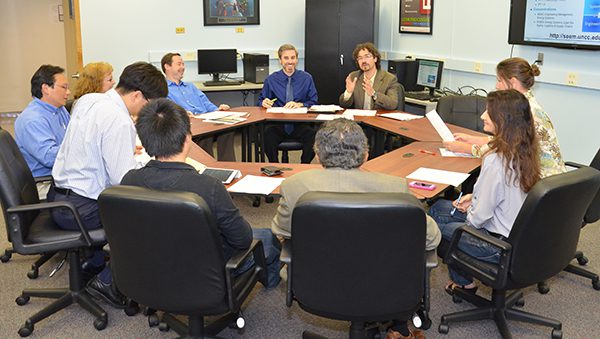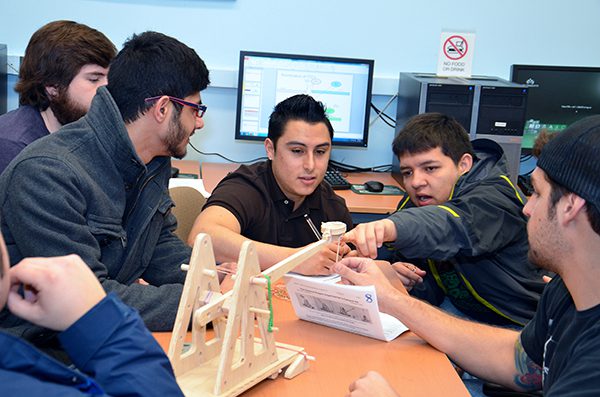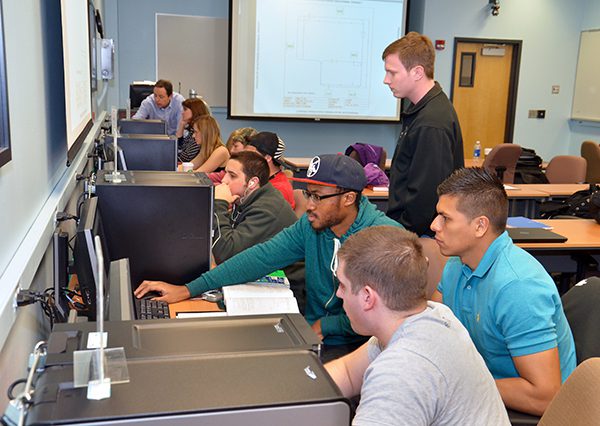Industrial and Systems Engineering
(named Systems Engineering and Engineering Management until 2023)
The study of systems engineering and engineering management brings together the technological problem-solving skills of engineering and the organizational and planning abilities of management. At UNC Charlotte, the Master of Science in Engineering Management started in 2000 as a technical alternative the MBA. In 2008, the Bachelor of Science in Systems Engineering program began as an undergraduate program teaching the design and management of complex engineering systems.

The first faculty member of Systems Engineering and Engineering Management (SEEM) at UNC Charlotte was Gary Teng, who came to the university in 2000. His first task was to establish the Master of Science in Engineering Management (MSEM) program.
“It was a brand new program and, I think, it was the first independent program on campus,” Teng said. “By independent I mean it was not part of a specific academic department. No one really knew how such as program was supposed to be set up and administered, not even the Provost’s Office.”
The unique opportunity of starting a brand new program is what drew Teng to UNC Charlotte. During his job interview, he and his family were also very impressed with the Charlotte community and the people they met here.
“I liked all the people I met,” Teng said. “That was a very important thing. They were very nice people who would be good to work with. During the interview Bob Johnson said his goal was to establish a program that would eventually become a department with both undergraduate and graduate programs.”
A college of engineering committee had been planning the MSEM program for more than a year before Teng came to Charlotte. The committee had developed the first curriculum for the master’s program and won approval for the program from the university Graduate Council. Teng began teaching courses in the new curriculum along with Bill Shelnutt of Engineering Technology and some adjunct faculty from industry.
“We started teaching in the fall 2000,” Teng said. “The first group of students numbered 15 to 20. All of them were working full-time jobs in addition to going to school.”
To accommodate the working professionals all of the engineering management classes were taught in the evenings.
The initial curriculum was comprise of four required courses in business administration, two required courses in engineering management and four elective courses. “I revised the curriculum the second year to make it four required engineering management courses, plus two required MBA courses and four elective courses,” Teng said.
A thesis option also gave students the opportunity to do a thesis project, which counted as two elective courses. The entire curriculum was designed to be flexible, so that students could concentrate their studies in areas they were interested in.
“It was also a very project-oriented program,” Teng said. “Every course had a project component. A number of the projects came from the companies where the students were working.”

The faculty for the program grew in 2003, when Yesim Sireli and Ertunga Ozelkan came on board. In 2009, the team began delivering and online option of the engineering management program. The online delivery was further enhanced in 2013 when it was expanded to include international students.
Throughout its history, the students in the MSEM program were primarily technical professionals looking for the next step in their careers. “Quite a few were looking to go into administration in their fields,” Teng said. “Many of them were also interested in becoming project managers. They wanted to be in charge of all the aspects of complex multidisciplinary projects.”
Working on project teams in school, the students got to know each other well, which sometimes led to them working together professionally. There were numerous examples of students telling their classmates about openings in their companies, and even a few cases where a student who was a manager hired one of their classmates.
To provide more areas of focused study, the MSEM program added concentrations in energy systems, Lean Six Sigma, logistics and supply chain, and systems analytics. In 2014, the MSEM program was ranked by U.S. News and World Report as one of the best online graduate programs in the United States.
To deliver systems engineering and management training to companies outside the university, SEEM started the Center for Lean Logistics and Engineered Systems (CLLES) in 2005. One example of the type of projects the center delivered was working with Duke Energy on the supply chain for lighting systems it was installing in multiple subdivisions.
Another CLLES project was providing Hunoval Law in Charlotte with Lean Six Sigma training for its employees and incorporated lean logistic strategy into the company’s business processes. Six Sigma training for Hunoval took place on the UNC Charlotte campus in a series of five-week programs customized specifically for the practice. It was designed to provide a Lean Six Sigma certification, so employees would be skilled in quickly identifying defects and redundancies, eliminating waste, and translating work into faster processes done with fewer errors.

Starting an undergraduate program in systems engineering had been a goal since the very beginning of SEEM. Planning for the program had been underway for a number of years, but implementation was delayed for budgetary reasons. Finally in 2007, the Bachelor of Science in Systems Engineering program was formally proposed and approved, and the first classes began in fall 2008.
“The purpose of the program was to fill the need for more professionals in the systems engineering discipline, not just in the Charlotte region and in North Carolina, but also in the whole nation,” Teng said. “People were asking for the program.”
The systems engineering program taught topics including the coordination of operational issues from a systems perspective, the understanding of future trends in global markets and economies, and the development of product creation, production, marketing and sales strategies. The degree had very broad applications in a wide variety of industries including energy, telecommunications, construction, manufacturing, transportation and distribution, information technology, financial services, automotive, retail, healthcare and airlines. Its application pertained to all levels of an organization from entry-level positions to top management.
Most of the first students in the systems engineering bachelor’s program were transfers from other universities or other UNC Charlotte departments. There were also a number of students seeking second bachelor’s degrees.
Like the master’s program, the undergraduate program was very project-oriented with many team assignments. “There was a lot of hands-on learning,” Teng said. “Many of the students also did summer internships during their junior years. Some of the employers were so impressed with the students that they offered them internships during their senior years, and even tried to hire them full-time. We really had to work to convince students not to take full-time jobs until they graduated. The placement statistics for the program’s graduates was excellent, with almost 100 percent getting jobs or going into grad school.”
The first class of the Bachelor of Science in Systems Engineering students graduated in 2011. There were seven graduates in the group. With its first students graduated, the SEEM department then applied for ABET accreditation of the bachelor’s degree program.

“We went for accreditation in three years,” Teng said, “and that was fast. Very fast. Faster than we initially planned. We had our ABET visit in fall 2011 and got accreditation in 2012.”
At that point, SEEM had a master’s degree program, accredited bachelor’s degree program, a student population of about 250, a number of new faculty, new certificate programs and a successful center. With all of this, UNC Charlotte recognized Systems Engineering and Engineering Management as an official university department in 2014.
The series of new certificate programs also began in 2014, and was designed to meet the needs of professionals wanting to improve their technical business management skills. The certificate programs were in Energy Analytics, Lean Six Sigma, Logistics and Supply Chains, and Systems Analytics.
“We created these programs to meet the need for engineers and other professionals to increase their knowledge in what have become important skill sets for modern workers to possess,” said Ertunga Ozelkan. “These topics in analytics and process improvement areas were an excellent next-step for engineers wanting to further their careers.”
During its first 15 years, the SEEM program had a number of physical homes on the UNC Charlotte campus including the Smith Building, Kennedy Building, Colvard Building and Cameron Center. Much of the time they were in Kennedy and Colvard, the buildings were being renovated and there was always constant construction noise.
“When I first came to UNC Charlotte I was told our program would be set up in the Cameron Center,” Teng said. “It took nine years and five stops at other buildings, sometimes going back and forth between buildings, before we got there.”
Despite the facility challenges, Teng enjoyed his years helping build the SEEM program. “It was like a family here, that was the key point,” he said. “In general the people working here and the students were very pleasant. This was great working environment. This was a nice place, period.”